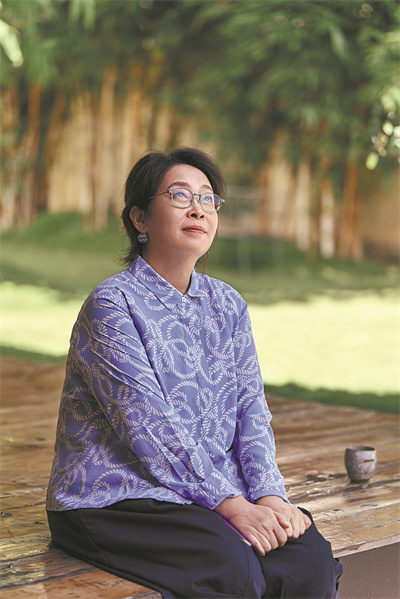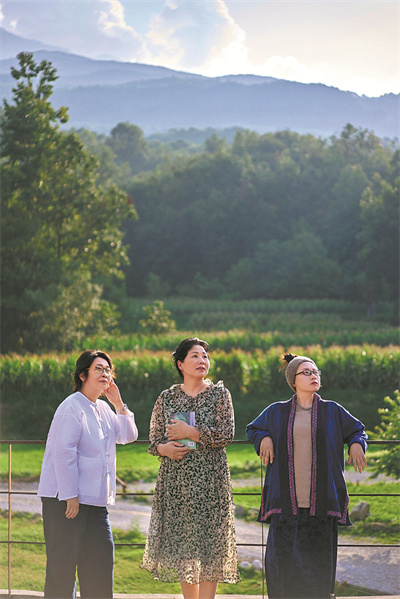
In a tranquil setting by Erhai Lake in Yunnan province, Liu Xiaoyang, a 56-year-old village woman, discusses her interpretation of the literary works of Albert Camus, W. Somerset Maugham and Ernest Hemingway with Zhang Yue, a former CCTV anchorwoman.
It's a scene from a recently aired online program, A Room of Her Own.
The last time these two women from completely different backgrounds had an on-camera dialogue dates back 23 years.
In the winter of 2001, the then 33-year-old Liu, a villager living in the rural plains near Xianyang, Shaanxi province, had her first opportunity to chat with someone in Mandarin, a language she learned by listening to the radio.
She was interviewed by Zhang, then the host of the CCTV television program Half the Sky, a show dedicated to women's issues.
They sat on two low wooden stools next to a firewood stack in front of a two-story self-built brick house, where Liu lived a daily routine similar to most local women — cooking, doing laundry, taking care of children and elders after marrying at 23.
Growing up in an isolated rural area where everyone spoke the local dialect, Liu would follow the radio announcer word for word as she worked in the fields, learning Mandarin. She listened to literary works such as The Ordinary World by Lu Yao on the radio.
She would also pick up incomplete books in the village, copy sentences that resonated with her and write down her feelings. She was a dedicated viewer of the TV program Half the Sky.
Yet, despite sensing a void in her repetitive daily existence, she lacked a confidant.
It wasn't until the fall of 2001 that she cycled more than 10 kilometers to the nearest post office, sending a letter to the Half the Sky program's production team. In it, she expressed her feelings of discontent and her desire for knowledge and the outside world.
Soon after, she had the aforementioned face-to-face interview.
Liu, clad in a red coat, gradually opened up to Zhang after they spent three days together.
When asked why she liked to wear bright red clothes, she said, "My clothes reflect a desire of mine — I want to live a more exciting life. I would rather endure the pain of discontent than become numb.
"It's not just about having food, clothes and shelter. I'm not satisfied with just that. I want a fulfilling life, I want knowledge, I want to read books, I want to watch TV and gain what I want from it — because I can't go to the outside world."
On March 23, 2002, the episode featuring Liu aired on television.
At the episode's end, Zhang commented, "When basic needs are scarce, survival is the focus. With plenty, the focus turns to the painful pursuit of spiritual fulfillment. In this sense, Liu represents each one of us."
The episode sparked wide discussion and resonated with a large audience.

People were touched by her poetic expressions such as, "I may be in pain, but I am not sad. Perhaps my pain is also a form of transformation", and "when someone longs for something, there is a gleam in their eyes".
A junior high school student named An Xiaoqing from the mountainous area of Daliangshan, Sichuan province, was among the viewers.
"That was the first time I saw an ordinary Chinese woman on a State media platform talking about her dissatisfaction and confusion with existence," An recalls.
Liu's words lingered in An's mind as she emerged from the mountains, enrolled in Chinese studies at Beijing Normal University and then became a features reporter.
An never forgot Liu and harbored a strong curiosity about her subsequent life.
In the winter of 2020, An finally visited Liu in person.
"Upon meeting her, I felt like a messenger at her doorstep, delivering 'letters' and 'packages' from the outside world — carrying within them the audience's curiosity, kindness and genuine concern for her," An recalls.
After conducting extensive interviews, An crafted a feature story titled Nora on the Plains, delving into Liu's turbulent inner world, her recurrent spiritual battles and quests for fresh life avenues.
In the end, Liu chose to embrace the poetic beauty close at hand rather than pursue faroff horizons.
The article reignited widespread discussions about Liu's story across the internet.
The visits by Zhang and An, two unexpected guests separated by nearly 20 years, provided Liu with a sense of relief — "Finally, someone who truly listens to me and with whom I could actually talk".
This year, as Zhang prepared for her latest program, A Room of Her Own, she hoped to reunite Liu with An, who now resides in Dali, and document their trilateral meeting.
During their conversation, Liu reminisced about her past attempts to break away, striving to lead a different life in the city.
"I felt disappointed in the city," she shares, recounting her time working in a factory in a southern city where she marveled at blooming red flowers lining the streets. However, no one around her knew the name of these blossoms.
Liu thought, "Something feels amiss. How can we overlook such beauty? It's a disservice to the flowers and their splendor."
She now believes that poetry isn't necessarily found in far-off places.
"It can reside within my heart — in my flower-filled yard, my farm fields and my children," she explains.
Liu also shares her family life where her husband, though not a reader, collects books for her, her daughter gifts her plant seeds and takes her to concerts, her daughter-in-law decorates her room with carnations, and her son encourages her to read Neapolitan novels by Elena Ferrante.
Zhang appreciates Liu's choice.
"If you are discontent with something, simply giving up is easy. However, accepting and adapting to it in the meantime, staying true to yourself, is incredibly challenging," Zhang says. "Liu has achieved this. She has faced numerous struggles but has not relinquished her spiritual freedom. Her family is filled with love, warmth and security. This is one of the reasons she possesses such a strong sense of self-worth.
"By carving her own path, Liu has embodied what I believe is the essence of a fulfilling life — grounding oneself in everyday life while allowing the soul to soar," Zhang adds.
A user of the review site Douban comments that people anticipate a specific conclusion for Liu, yet there is no definitive ending — just an ongoing journey. She persists in her love for life, nurturing her crops and blooming garden. Within her intimate realm, she seeks poetic beauty, perpetually contemplating and being stirred. Much like Sisyphus pushing his boulder, despite fate's relentless approach, she defies it. This enduring determination stands as the most inspiring aspect.
The program A Room of Her Own aims to present diverse women's life stories to inspire females to continuously engage in reflection and personal growth, writing their extraordinary tales within the ordinary.
The title of the program is inspired by A Room of One's Own by Virginia Woolf, a prominent feminist writer of the early 1900s.
Approximately 100 years ago, Woolf imagined a scenario where Shakespeare had a sister of equal talent who, hindered by gender-based obstacles at every step, was unable to exhibit her abilities and tragically took her own life on a winter evening.
Woolf encourages all women: "If we have the habit of freedom and the courage to write exactly what we think; if we escape a little from the common sitting room and see human beings not always in their relation to each other but in relation to reality; and the sky, too, and the trees or whatever it may be in themselves … if we face the fact, for it is a fact, that there is no arm to cling to, but that we go alone and that our relation is to the world of reality and not only to the world of men and women, then the opportunity will come and the dead poet who was Shakespeare's sister will put on the body which she has so often laid down. Drawing her life from the lives of the unknown who were her forerunners, as her brother did before her, she will be born."
These words are inspiring for Zhang, and she is determined to do something that would help "Shakespeare's sister to be born".


